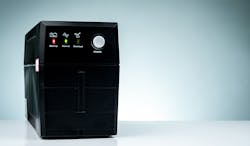Cautionary Advice as Businesses Reopen: Protect Your Power
March 2021 marks the first anniversary of the United States declaring a nationwide emergency to combat COVID-19. This month also shows encouraging signs of many businesses reopening after being shuttered or having operated with a smaller workforce and reduced schedule. Others continue to tax their facilities by performing non-stop at peak capacity. No matter the case, it is a good time for operators to evaluate their company’s power protection to guard against unanticipated consequences from extended downtime to pushing equipment to the limit.
“Equipment failure due to an underperforming or faulty power protection can derail the best plans for a strong return to ‘business as usual.’ Keeping power as clean as possible is where protection begins,” explains Tom Gornick, CEO of NXT Power, manufacturer of advanced power quality solutions.
Clean power delivers optimum benefits to connected equipment. Business owners gain a prolonged and reliable lifespan for their equipment. When you control the impact of high-frequency noise, spikes, breakouts, and blackouts, these disturbances damage sensitive electronic systems such as lab equipment, semi-conductor processing systems, and any other equipment that depend on a microprocessor to run them.
“As businesses come back online, demand will increase on the current equipment installed,” Gornick says, “and power protection becomes even more critical to maintain operations.” When products like power conditioners and isolated Uninterrupted Power Supply (UPS) systems are placed between the incoming power source and the device it is protecting, the equipment is totally protected from all power quality issues your system may see.
Irregularities such as voltage and frequency variations as well as high-frequency noise contribute to “dirty” power. With dirty power, businesses can experience loss of sales, downtime, wasted materials, inventory spoilage, missed production deadlines, and more depending on the industry. Power line noise is one of the last problems you want to worry about when keeping your sensitive equipment online and operational. “By preventing hardware damage and system interruptions, businesses can ensure maximum uptime and revenue generation,” Gornick adds.
Based on how integral technology is in today’s business world regardless of the industry, power protection needs are universal from office computer applications and manufacturing production lines, hospitals lab equipment to grocery stores, and from the hospitality industry operations.
“It’s almost a cannibalistic environment, where all the equipment noise beats upon each other if equipment’s power source is not properly protected,” says Gornick. Other noisy perpetrators include lightning storms, grid switching, hospital generator testing, and elevators. The possible circumstances for creating dirty power are numerous but the solution is always the same: protect your power.
According to Gornick, “Power conditioners protect devices in much in the same way a fuel filter protects the engine in a car. The fuel filter sifts out any impurities in the gasoline so your engine can perform to its peak demand. Imagine how your car would perform without the fuel filter!”
A power conditioner provides the same benefit for “dirty” AC power. It filters out the high-frequency noise and spikes (impurities) that get generated on the AC line, providing the equipment attached to perform without any issues.
UPS Systems provide a bridge between the AC power system and the electrical grid (the power utility provider). If there is a break in the distribution system, the UPS is there to bridge that gap, so your systems connected to the UPS does not come crashing down.
To avoid loss of productivity and revenue due to issues related to power quality, Gornick advises seeking the advice of a power quality expert to evaluate your company’s current system and make sure it has the proper power quality products in place to guarantee uptime for all your company’s processes.
TIPS TO PROTECT YOUR POWER
To prepare yourself for assessing your company’s current power protection system, here is some guidance on how to start:
- Identify UPS providers with knowledge about your industry by reviewing their customer list and participation in industry associations
- Do your research and learn about the latest clean, reliable, and highly advanced power solution that others in your industry use
- Look for essential system elements like surge diversion, low impedance isolation transformer, noise filtering, and voltage/frequency regulation
- Consider the importance of a reliable customer support team that can solve your power quality problems from initial consultation and operational integration to emergency repairs.
Questions? Give Tom Gornick a call at 877-678-7697 or at [email protected] for help analyzing your individual circumstance at no charge. Plan an initial virtual or in-person meeting.
About the Author
Laura Davis
Editor-in-Chief, New Equipment Digest
Laura Davis is the editor in chief of New Equipment Digest (NED), a brand part of the Manufacturing Group at EndeavorB2B. NED covers all products, equipment, solutions, and technology related to the broad scope of manufacturing, from mops and buckets to robots and automation. Laura has been a manufacturing product writer for eight years, knowledgeable about the ins and outs of the industry, along with what readers are looking for when wanting to learn about the latest products on the market.
